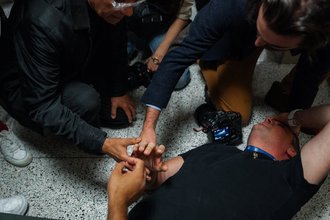
Journalist or not, photography isn’t a hate crime
Gatekeeping over hate crime charges misses the forest for the trees

Gatekeeping over hate crime charges misses the forest for the trees

Plus: Journalist Mario Guevara has been deported

His prosecution is over, but the implications for journalists are alarming.

Next week, the High Court in London will consider whether Julian Assange should be extradited to the United States to face charges under the Espionage Act for obtaining government secrets from a source and publishing them. Even if you don’t like Assange, or don’t think he’s a journalist, his case poses an existential threat to the First Amendment rights of the journalists you do like.

Whether Julian Assange is a journalist is irrelevant to the threat his prosecution poses to press freedom

Advocates, journalists want answers on why the government risked criminalizing routine journalism to pursue Espionage Act charges against WikiLeaks publisher

Julian Assange has finally been freed after reaching a surprising deal with U.S. authorities to plead guilty to violating the Espionage Act. The plea deal avoids the worst outcome of a court precedent that could be used against journalists, but it still threatens press freedom.

On Tuesday, the High Court in London granted WikiLeaks founder Julian Assange another hearing on his extradition to the United States, averting — at least temporarily — a press freedom catastrophe. While we’re glad that Assange isn’t being immediately extradited, the threat to journalists from the Espionage Act charges against him remains.

Through op-eds and TV appearances, FPF made clear that the Biden administration deserves zero credit after forcing Julian Assange to plead guilty to get out of prison

Letter from legal scholars explains how prosecuting Julian Assange threatens press freedom